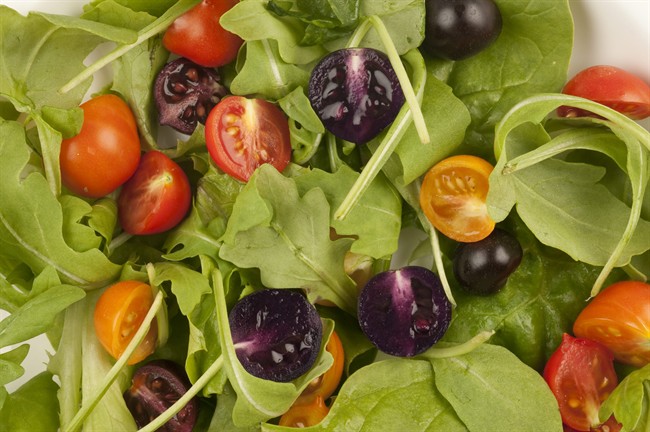Federal health officials are warning that a string of E. coli infections across Canada could be linked to leafy green vegetables.

About a dozen E. coli-related illnesses have been reported so far. It’s unclear what specific produce may be contaminated but the Public Health Agency of Canada is reminding consumers to follow safe food handling practices.
Right now, PHAC is working with its provincial counterparts to investigate the mysterious outbreak. Nine cases were reported in Alberta, while single cases popped up in Saskatchewan, Ontario, and Newfoundland between March 13 and March 31.
READ MORE: Food products recalled over listeria and E. coli concerns
“Based on the investigation findings to date, exposure to leafy greens has emerged as a possible source of illness. Leafy greens can include all varieties of lettuces and other green leaf vegetables such as kale, spinach, arugula or chard,” the federal agency said in its advisory.
Once a product is identified, the Canadian Food Inspection Agency will inform the public and make sure it’s removed from grocery store shelves.
E. coli is bacteria that lives naturally in the intestines of cattle, poultry, and other animals. It’s usually harmless to humans but some varieties can cause illness. Most people end up with stomach pain, vomiting and diarrhea.
READ MORE: Costco, Sobeys chicken salads recalled for listeria risk
- Health task force blasted over ‘dangerous guidance’ for cancer screenings
- Dentists hesitant to sign up for federal dental plan; seniors advised to look at all options
- David Chang’s Momofuku to stop ‘chile crunch’ trademark battle after outcry
- Over 25% of young Canadian deaths linked to opioids amid pandemic: study
Anyone can get an E.coli infection but it’s most dangerous for pregnant women, those with a compromised immune system, kids and seniors.
READ MORE: UBC researchers find antibiotic-resistant E. coli on local produce
Here are tips from the PHAC on safe food handling:
- Wash fresh fruits and vegetables before eating them, clean counters and cutting boards and wash your hands regularly.
- Bacteria can grow in the danger zone between 4 °C and 60 °C (40 °F to 140 °F). Keep cold foods cold at or below 4 °C (40 °F) and keep hot foods hot at or above 60 °C (140 °F).
- Keep refrigerators clean and at a temperature below 4 °C (40 °F). Install a thermometer in your fridge to be sure.
- Place raw meat, poultry and seafood in containers on the bottom shelf of the refrigerator. Use containers that are large enough to prevent raw juices from dripping onto other food or touching other food.
- Keep raw food away from other food while shopping, storing, preparing and serving foods.
- Read labels and follow cooking and storage instructions for all food. When buying food, make sure to check the “best before” date, and if the product has expired, let the store know.
- Use warm soapy water to clean knives, cutting boards, utensils, your hands and any surfaces that have come in contact with food, especially meat and fish.
- Refrigerate or freeze perishable food within two hours of cooking.
- Freeze or consume leftovers within four days of cooking. Always reheat leftovers until steaming hot before eating.
Read the full advisory here.
carmen.chai@globalnews.ca
Follow @Carmen_Chai
Tell us your story: Have you gotten sick from food contaminated with e.coli, salmonella or similar diseases? Do you have a horror story to share? We want to hear from you.
Note: We may use what you send us in future stories. While we may get in touch, however, we won’t publish or share your contact info.




Comments